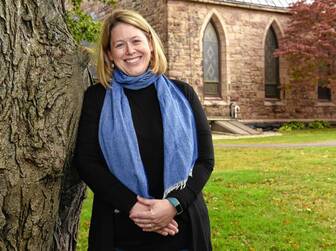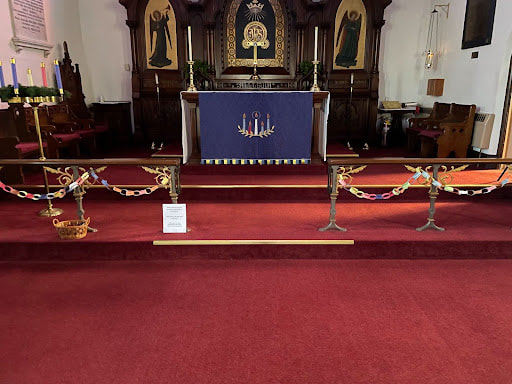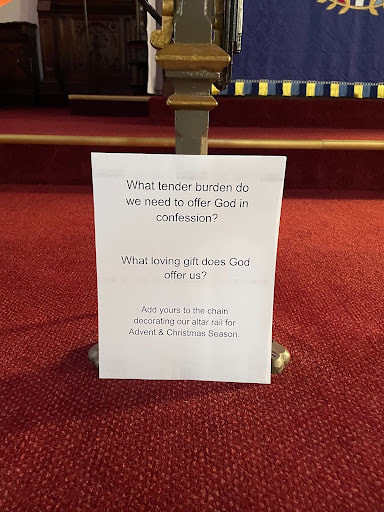|
By Rev. Heather J. Blais, Rector  Today we heard the opening verses of Mark’s gospel. It starts: “The beginning of the good news of Jesus Christ, the Son of God.”* Some translations read, “The beginning of the Gospel of Jesus Christ, the Son of God.”* Still other ancient translations lack ‘the Son of God’ at the end of the sentence.* We are one sentence into the gospel, and there is already so much we could unpack! All this is to say, we are looking at an ancient text, that is living and breathing, and always has new insights to offer us. As our United Church of Christ friends like to say, “God is still speaking.” When we think of the gospels, we tend to think of books. Yet when this text first came into being it was something much more provocative. It was a text that proclaimed the Gospel of Jesus Christ over and against the more widely accepted, or at least tolerated, Gospel of Caesar.* Mark is proclaiming Jesus as a kind of Messiah figure over and against Caesar. Listeners have to decide what sort of Messiah Jesus might be: Royal? Priestly? Prophetic? Salvific? Peaceful? Maternal?*Right off the bat, Mark is turning the world as people knew it upside down and right side up again with Jesus’ message. Mark’s action packed, direct, and brief gospel is urgently proclaiming there is good news to hear NOW. In the next two verses, Mark grounds his narrative in the prophets. While our translation names one prophet, specifically Isaiah; other ancient texts simply refer to ‘in the prophets’.* This explains why Mark pulls from both Malachi and Isaiah (Mal 3:1; Isa 40:3).* Scholars think he drew his reference from a testimonia, which was a collection of verses on a common theme; in this instance ‘God’s way.’* Mark tells of a new prophet, reminiscent of Elijah, who is preparing God’s way. ‘Way’ was a technical term in Greek, Jewish, and Christian discourse.* It generally meant choosing the good or better path, albeit difficult, instead of the immoral or easy path. We know from Acts of the Apostles that early believers did not call themselves Christians, but rather people ‘belonging to the way’(9:2). It is why we talk about the ‘Way of Love’. And why in Mark’s gospel, John the Baptist is proclaiming the ‘Way of Jesus’.* John’s primary tool for ‘preparing the way’ was a form of baptism. Water purification rituals had already been on the rise, as they offered cleansing after a period of impurity.* These rituals supported the Jewish community as they lived into the cleanliness and purity laws outlined in the Torah.*For example, following menstruation or coming in contact with a deceased person, one might partake in a water purification ritual.* That said, John the Baptist took a water purification ritual and gave it new symbolic meaning to forgive sins. The end result was that droves of people were coming to see him in the wilderness. Mark writes: “John was baptizing in the wilderness, proclaiming a baptism of repentance for the forgiveness of sins. And people from the whole Judean countryside and all the people of Jerusalem were going out to him and were baptized by him in the river Jordan, confessing their sins.” It’s quite curious. What was it about John the Baptist, his message, and this ritual that was so attractive to the masses? Commentator Timothy Adkins-Jones speculates why. He writes “[John the Baptist’s] location in the wilderness and his peculiar clothing did signal a certain kind of prophetic bona fides. His camel-hair frock and leather belt would have signified a connection to Elijah. The peculiar diet, locusts and honey, also would have nodded to Elijah as they demonstrated a kind of desperate dependence on God for sustenance that mirrors what Elijah went through by the brook Cherith.”** He goes on to say: “One thing that seems clear…is that the people were passionate about something that would affect them right then and there. This was not a baptism or even evangelism that pointed toward an afterlife; they were rushing to the wilderness for something that would change their lives at that moment… The people were excited not only about getting to John, receiving the baptism, but also about confessing their sins. It seems that the combination of the baptism ritual and the confession of their sins was a cleansing process that allowed them to return to their communities not only with a newfound commitment to their faith but also free of the burden of those sins.”** And all the while giving people hope by alluding something more was to come, one even greater than he who would baptize with the Holy Spirit. John was offering something people were desperate for: the release, grace, forgiveness, and new beginning that we receive whenever we genuinely confess our sins and seek to start again. That is why droves of people were headed into the wilderness for this ritual. There was a new awareness that we do not need to go through this life carrying the heavy burdens of our mistakes, shame, and brokenness. Because when we let that keep us down in the spiritual gutter it limits our capacity to keep growing in faith and to love our neighbor as we love ourselves. After all, when we are unable to love ourselves, we limit our ability to authentically love our neighbor. John was offering them redemption, hope, and the joy of beginning again. One of the things I love about our tradition is that in most of our liturgies we have a confession of sins. We confess our brokenness and mistakes not because of our awfulness, but because of our humanness. If we are to be authentically human, and be in a relationship, it means we are going to take risks, make mistakes, hurt one another, and fall short. Our liturgy celebrates this as part of the human experience, and recognizes our need to offer those tender burdens to God as an offering. And in turn God offers us whatever it is we most need in that moment: absolution, compassion, grace, forgiveness, love, hope, joy, peace, abundance of life, and so on… Walter Brueggeman writes in prayer, “We carry old secrets too painful to utter too shameful to acknowledge too burdensome to bear, of failures we cannot undo, of alienations we regret but cannot fix, of grandiose exhibits we cannot curb. And you know them. You know them all. And so we take a deep sigh in your presence, no longer needing to pretend and cover up and deny. We mostly do not have big sins to confess, only modest shames that do not fit our hoped-for selves. And then we find that your knowing is more powerful than our secrets. You know and do not turn away, and our secrets that seemed too powerful are emptied of strength, secrets that seemed too burdensome are now less severe… …We long to be fully, honestly exposed to your gaze of gentleness. In the moment of your knowing we are eased and lightened, and we feel the surge of joy move in our bodies…”*** Brueggemann writes of the discovery we experience on repeat if we are open to it.Each time we offer our tender wounds and burdens to God in confession, we make space within ourselves to receive whatever it is we need most from God at that moment: being seen and known, accepted and loved, always and forever. Changed once again by God’s loving embrace, and living that change with those around us. We know that this season of Advent is a time of getting ready. Last week we spent some time getting ready by proclaiming where we see hope, and our answers will continue to grace the door of our sanctuary this Advent and Christmas. Today, I’m going to ask us to do another wild and risky thing - and then I promise, no more activities, at least until next year! I want to invite us into a couple of minutes of quiet reflection so we might consider:
Our ushers are going to give you a couple of slips of paper, and if you are comfortable doing so, I would encourage you to write down a word, phrase, or symbol that reflects your answers. Then either hand them to an Usher or come forward and staple yours onto our paper chain, and if you're more comfortable, the confession could be on the inside. This chain will decorate our altar rail as a symbol of our offering and gratitude to God that will be here through Advent and Christmas season. For those joining us online, please feel free to add them to the comment section or send me an email so they can be added to the paper chain. (Silence, reflection, & activity) This is one more small way that we continue to ready ourselves for the coming of the Christ-child. We offer this all to Your Glory, O God. Amen. * The Jewish Annotated New Testament (pg 69-70). ** https://www.workingpreacher.org/commentaries/revised-common-lectionary/second-sunday-of-advent-2/commentary-on-mark-11-8-6 *** From Whom No Secrets Are Hid, Prayers for a Privileged People, pg 7-8 Comments are closed.
|
We are blessed to have a diversity of preaching voices in our parish. Our guild of preachers is a mixture of lay and clergy. We hope you enjoy the varied voices. Meet our Preachers
All
Archives
July 2024
|

